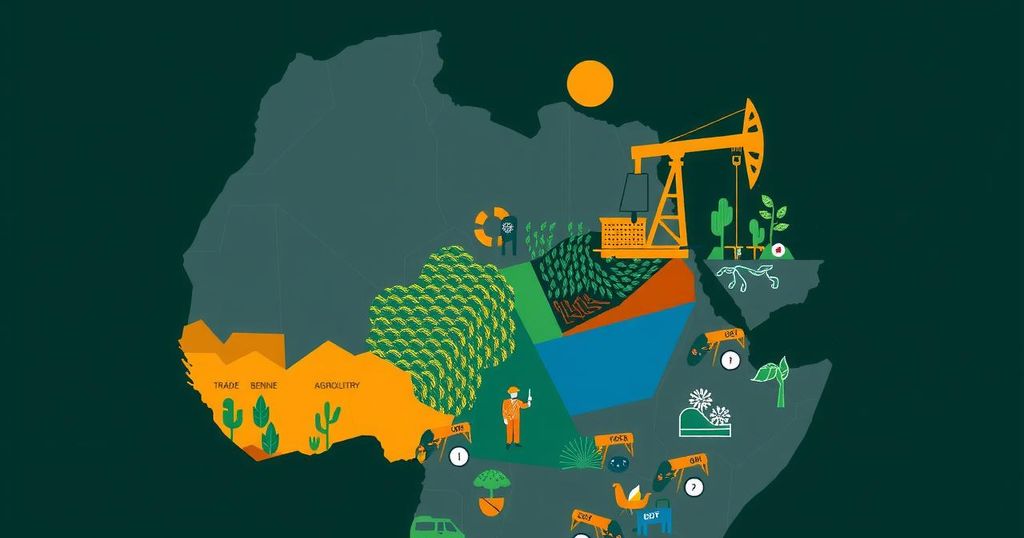Benin’s economy relies heavily on foreign support, particularly from France, and has undergone substantial reforms from socialist policies to privatization since independence. Agriculture employs around 70% of the population, focusing on key crops like cotton and cassava. The country benefits from various natural resources and has initiated industrial growth, though it faces ongoing challenges regarding trade balance and infrastructure.
Since its independence, Benin’s economy has heavily relied on external financial support, particularly from France and various international organizations, to alleviate significant economic stagnation and improve living conditions for most citizens. A socialist-inspired regime attempted to transform the economy through nationalization and reduced reliance on France beginning in 1975. However, despite initial reforms and a shift toward liberalization in the mid-1980s, issues of corruption persisted, ultimately necessitating the privatization of many sectors in the early 1990s.
Benin possesses several natural resources, including tropical hardwoods, iron ore, and offshore oil, notably discovered off the coast in 1968. Agriculture prevails in the nation’s economy, employing approximately 70% of the workforce. Key agricultural products include yams, cassava, and notably cotton, which has surged in production in recent decades alongside other cash crops, while fishing also provides substantial export earnings.
Industrially, Benin houses manufacturing facilities, especially in palm oil processing, cement production, and textile manufacturing. Electricity generation primarily occurs through thermal plants, with half supplied by imports from Ghana. The financial landscape was revamped in the late 20th century, transitioning from state-controlled banks to private institutions, spurred by an influx of foreign developmental aid.
Benin’s export economy relies on cash crops such as cotton and palm oil, with significant informal trade occurring over the Nigerian border impacting trade balance. The deepwater port in Cotonou, vital for trade, facilitates exports while the nation’s imports consist of manufactured goods sourced from countries like India and Thailand. Transportation infrastructure includes a limited paved road network, railroads, and navigable waterways, connecting its internal regions and facilitating commerce.
In conclusion, Benin’s economic evolution showcases significant changes over decades, with reliance on external support, attempts at economic restructuring, and ongoing diversification efforts through agriculture and industry. The country continues to navigate challenges in trade, infrastructure, and development while aiming for a more sustainable and self-sufficient economic framework.
Benin, located in West Africa, has faced prolonged economic challenges since gaining independence. The nation struggled with a dependent economy, primarily reliant on international aid and investment. Policies pursued by various regimes over the years, including nationalization and subsequent privatization, significantly influenced the state of the economy. Additionally, Benin’s rich agricultural landscape and natural resources, such as oil and minerals, play crucial roles in shaping its trade and industry sectors. The country’s economic trajectory is marked by attempts to enhance self-sufficiency while acknowledging ongoing challenges within its trade balance and infrastructure development.
Benin’s economic landscape has undergone significant transformations since its independence, characterized by external dependency, ambitious governmental reforms, and ongoing structural adjustments. Despite challenges such as corruption and unbalanced trade, the country continues to develop its agricultural and industrial potential, relying on key exports and managing its financial landscape to improve the living standards of its citizens. Future efforts towards further economic diversification and infrastructure development remain essential for sustained growth and stability.
Original Source: www.britannica.com







